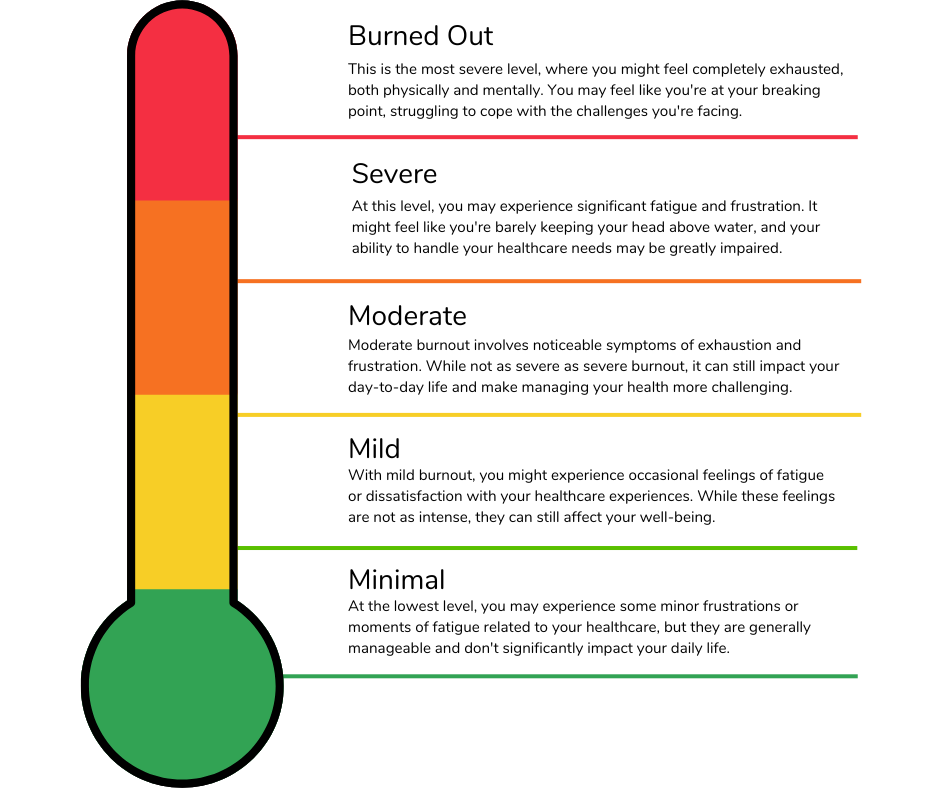Understanding Patient Burnout: How to Navigate Healthcare Stress
In the complex world of healthcare, patients often find themselves on a journey filled with highs and lows, triumphs and challenges. But what happens when those challenges start to feel overwhelming, leaving you emotionally, mentally, and physically drained? This is what we call patient burnout, and it’s more common than you might think.
Picture this: You’re juggling appointments, medications, treatments, and endless paperwork. You’re waiting anxiously for test results and struggling to understand complex medical jargon. It’s like trying to solve a puzzle with missing pieces, and it can leave you feeling frustrated, exhausted, and on the brink of giving up.
But here’s the thing: You’re not alone. Patient burnout is a real and valid experience that many people face during their healthcare journey. It’s a natural response to the stress, uncertainty, and challenges that come with managing your health and navigating the healthcare system.
So, What Exactly is Patient Burnout?
It’s that feeling of being emotionally drained, mentally exhausted, and physically fatigued from the demands of your healthcare experiences. It can manifest in many ways, from feeling overwhelmed and hopeless to losing interest in your treatment plan or experiencing mood swings and irritability.
Recognizing the signs of burnout is the first step towards addressing it. Are you feeling constantly tired, even after a good night’s sleep? Are you finding it hard to concentrate or make decisions? Do you feel like you’re losing motivation or interest in activities you used to enjoy? These could all be signs that you’re experiencing burnout.
Coping with Patient Burnout and Regaining Control Over Your Healthcare Journey:
-
Reach out for support: Talk to your healthcare provider, friends, family, or a therapist about what you’re going through. Sometimes, just having someone to listen can make a world of difference.
-
Take breaks: Give yourself permission to step back and take a breather when things start to feel overwhelming. Whether it’s a short walk outside, a relaxing bath, or indulging in your favorite hobby, taking time for yourself is essential for maintaining your well-being.
-
Stay informed: Knowledge is power. Educate yourself about your condition, treatment options, and rights as a patient. The more informed you are, the better equipped you’ll be to advocate for yourself and make informed decisions about your healthcare.
-
Practice self-care: Make self-care a priority in your daily routine. Eat healthily, exercise regularly, get enough sleep, and engage in activities that bring you joy and relaxation. Taking care of your physical and emotional well-being is crucial for preventing and managing burnout.
-
Set boundaries: Learn to say no to things that drain your energy or add unnecessary stress to your life. It’s okay to prioritize your needs and establish boundaries to protect your well-being.
Remember, patient burnout is not a sign of weakness. It’s a natural response to the challenges of managing your health, and it’s okay to ask for help when you need it. By recognizing the signs of burnout and taking proactive steps to address it, you can regain control over your healthcare journey and reclaim your sense of well-being. You’re stronger than you think, and you have the resilience to overcome whatever challenges come your way.




